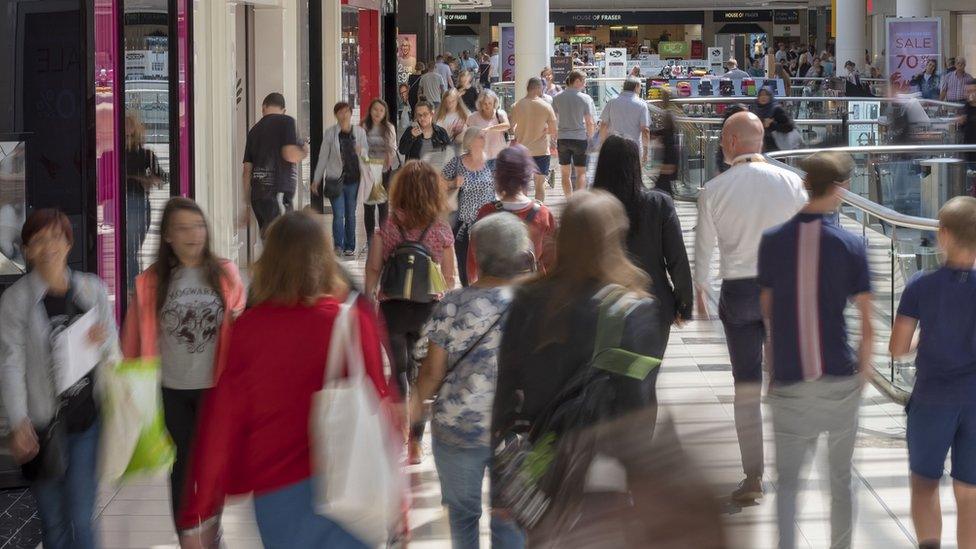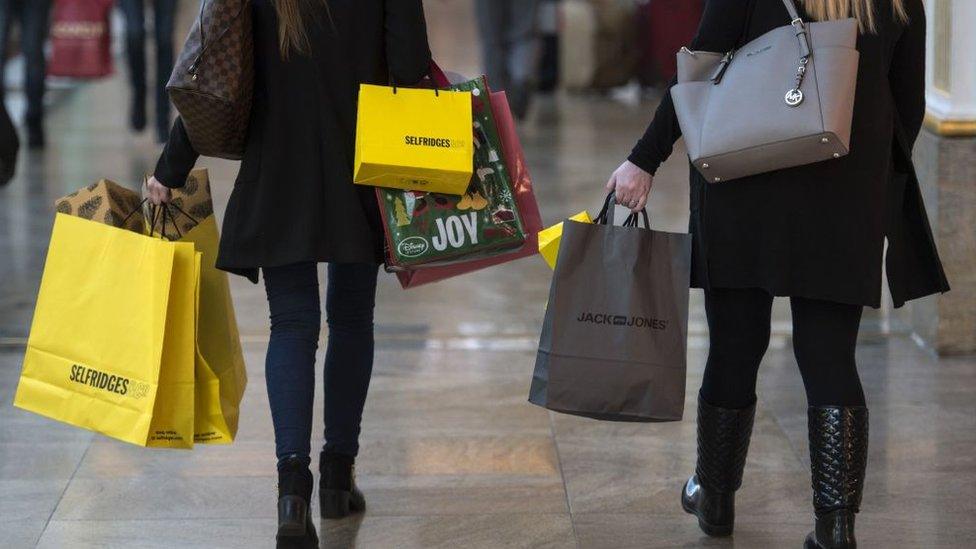Intu warns shopping centres may close as funding talks continue
- Published
- comments

Intu, owner of the Trafford, Braehead and Lakeside shopping centres, is warning its financial troubles could see entire sites shut.
It has lined up administrators KPMG as a "contingency" in case financial restructuring talks with lenders fail.
Intu warns that if that happens it will have to give KPMG funds for certain services, or see the centres shut.
The company is the biggest shopping centre chain in the UK with 17 UK outlets and three in Spain.
Intu has until Friday to sort out a new financial footing.
The company said: "In the event that Intu properties plc is unable to reach a standstill, it is likely it and certain other central entities will fall into administration.

Intu owns the Trafford Centre in Manchester
"If that happened, the various group companies would have to put money into the administrator. If the administrator is not pre-funded then there is a risk that centres may have to close for a period."
Intu's group companies provide key services to the sites, from lighting and cleaning to health and safety systems, security and essential maintenance.
Intu had been struggling before coronavirus to fill outlets within some centres sites and had heavy debts. It said in March it was in talks with lenders about new funding.
On Tuesday, Intu said "notwithstanding the progress made" it had appointed KPMG to plan for administration.
Since the coronavirus lockdown Intu's centres have been partially shut, with only essential stores remaining open.
The company had about 60% of shopping centre staff and about 20% of head office employees on furlough.
The firm's financial woes include making a loss of £2bn in 2019, failing earlier this year to raise £1bn in new funding, and having debts of £5bn.
The collapse and contraction of High Street retailers in the face of rising costs and the seemingly ever-increasing online shopping trend had already seen retailers closing outlets, leaving a number of landlords, such as Intu, struggling to fill empty space. Many among the remainder are finding it harder to meet rent payments.
Retail consultant Kate Hardcastle said the writing had been on the wall for such centres for some time. "Intu's model is heavily dependent on big box retailers paying rent for big retail spaces, and with the rise and rise of online and consumer spending shifting to travel and experience rather than pure retail it was probably on precarious ground."
She added that its shopping centres had become places for "show-rooming", where consumers see the products they want, then go home and buy them more cheaply online.
The company is well down on normal income levels. Intu's latest update on rent collection said it had received only 40% of rental and service charge income for the first quarter of the year. It had moved from quarterly rent collection to more flexible arrangements with shop owners.
Intu has been attempting to sell shopping centres to raise cash and has sold off its outlet in Zaragoza, in Spain.

Intu's UK shopping centres
Braehead, Glasgow
Broadmarsh, Nottingham
Chapelfield, Norwich
Derby
Eldon Square, Newcastle
Lakeside, Essex
Merry Hill, West Midlands
Metrocentre, Gateshead
Milton Keynes
Potteries, Stoke-on-Trent
Trafford Centre, Manchester
Uxbridge
Victoria Centre, Nottingham
Watford
Centres run as joint ventures:
Manchester Arndale
St David's, Cardiff
The Mall, Cribbs Causeway
Plus three centres in Spain

Intu's possible demise has been a long time foretold. The retail landlord, still better known to some by its former name, Capital Shopping Centres, has always carried a high level of debt relative to its peers, and the gradual drift away from bricks and mortar shops to the internet left it with less margin for error if a downturn came.
But the company still had an impressive list of blue-chip assets - some of the best malls in the UK, a decent defence, most thought, against the predations of online competitors. Just two and a half years ago it was still riding high. Its FTSE 100 rival Hammerson made a takeover approach at 253p a share, valuing Intu as a whole at £3.4bn. Intu shares are now at 4.5p, giving the whole company a stock market value of £60m.
That staggering fall has been caused by that steady erosion of sales away to the internet, and then the shattering blow of the coronavirus. Intu is now collecting one-third less rent at some of its flagship malls than it was a year ago. It is in breach of the conditions of agreements it made with the lenders who financed those individual properties. If it cannot reach a peace deal with those lenders, administration beckons.
What happens next is difficult to predict. The management may be able to stitch together an agreement with lenders, in which case it will limp along until it is able to refinance. If administration comes, it could be a messy restructuring, with different lenders holding the whip hand on individual properties. As the company itself points out today, the uncertainties that come with administration could even mean that some of Britain's best-known shopping centres have to close, if only temporarily.
- Published17 June 2020

- Published21 June 2020

- Published12 March 2020

- Published20 January 2020
